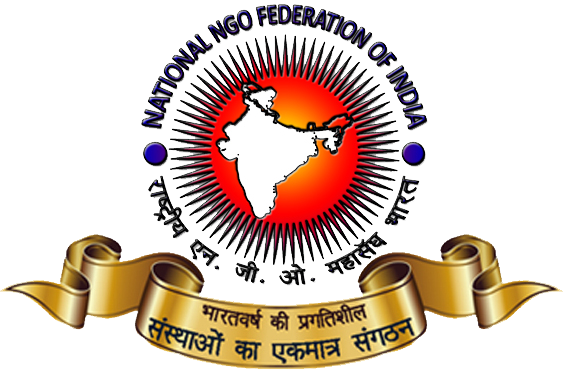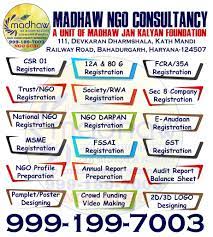NGO Registration
- NGO Registration
- Difference in Company, Society and Trust
- How to Start NGO – Form, Register and Run NGO
- Why to Register NGO
- How to run and manage NGO?
- Society Registration
- Society Registration Process and Procedure
- Name Change Process for Society
- How to Register NGO
- Societies Registration Act, 1860
- Public Charitable trust
- Registration Process of Public Charitable Trust
- After Registering the Public Charitable Trust
- Section 8 Non Profit Company Registration
NGO Resources
- NGO Resources
- NGO & Government of India
- NGO Partnership Registration
- Relations of NGOs with Business and Commerce
- Public Grievances Resolution related to Government
- Social Calendar
- NGO Management
- NGO Support
- What is NGO
- Voluntary Organisations and Volunteerism
- NGOs : Classification, Definitions, Typologies and Networks
- Understanding NGOs
- Can any Government Employee or Officer be the member of NGO?
- Income Exemption u/s 35AC Revoked
- Aims, Objectives & Programmes for NGO
NGO Funding & Grants
- NGO Funding
- Fundraising
- Funding and Grant Schemes
- Govt Schemes
- How to raise Funds for NGO
- Project Proposal Process
- Fundraising Ideas and Concepts
- Funding Agencies
- CSR Funding Empanelment by National CSR Hub
- CSR Funds through Corporate
- CSR Policy, Rules, Regulations and Guidelines of Government
- Government Funding Ministries
- International Funding Agencies
- Google for Nonprofits
- Fellowship
- CSR Funding
- Fund Raising
- Government Funding
- Grant Proposal for NGO Writing Preparation Process
- Project Proposals
Indian Non-Profits
- Andaman Nicobar
- Arunachal Pradesh
- Andhra Pradesh
- Assam
- Bihar
- Chandigarh
- Chhattisgarh
- Dadra Nagar Haveli
- Daman and Diu
- Delhi
- Goa
- Gujarat
- Haryana
- Himachal Pradesh
- Jammu Kashmir
- Jharkhand
- Ladakh
- Karnataka
- Kerala
- Lakshadweep
- Madhya Pradesh
- Maharashtra
- Manipur
- Meghalaya
- Mizoram
- Mumbai
- Nagaland
- Orissa
- Pondicherry
- Punjab
- Rajasthan
- Sikkim
- Tamil Nadu
- Telangana
- Tripura
- Uttar Pradesh
- Uttarakhand
- West Bengal
Difference in Company, Society and Trust

Difference between various Types of NGOs:
What is difference between Society, Trust and Non Profit Company, it is given here. All the forms as Trust, Society or Non Profit Company are known and classified as NGO. Society, Trust or Non Profit Company all are known and identified as NGO, only formation, registration and management processes are main difference. There are other differences given below. Those who want to form or run NGO can check and find that what kind of NGO formation they prefer. NGO can be formed in any type for social welfare and social development.
|
Procedures, Rules and Requirements |
Company |
Society |
Trust |
|
Registration |
Non |
Society |
Trust |
|
Law/Act |
Companies |
Societies |
Indian |
|
Time |
15 |
15 Days-2 Months. |
From |
|
Registering Authority |
Registrar of Company. |
Registrar or Deputy Reg. of |
Sub-Registrar of Registration/ |
|
Issue of Name approval |
Before registration name approval |
If any other NGO is not registered |
Name approval is not required, if |
|
The State Emblem of India |
Name cannot be approved if the |
Name cannot be approved if the |
The names restricted under the |
|
Eligibility of Family Members to |
Anybody can be the director of a |
Members of the same family can not |
There is no restriction in |
|
Minimum Members/ Directors/ |
Minimum Two Directors. |
Minimum Seven Members. |
At least (Minimum) Two Trustees. |
|
Minimum Members at National level |
Minimum Two Directors. |
Minimum Eight Members from 8 |
Minimum Two Trustees only, no |
|
Governing Structure |
1. General Body of Directors. |
1. General Body. |
1. General Body/Board of Trustees. |
|
Area of operation of NGO |
Company can be operated throughout |
Society can be operated throughout |
Registration under Trust Act has |
|
Status for Rights of Vote and |
Provision of the voting rights |
All members of a society have |
All Trustees have equal rights |
|
Can get funding. There is no |
Company can have funding |
Society can get funding if it is |
Trust can get funding if it is |
|
Annul Reports and other Documents |
Company has to submit Annual |
According to the Section 4 of |
No Annual report, resolution or |
|
General Body and Board meetings |
In the Companies Act there are |
General Body and Board meetings |
No provisions exist to organise |
|
Transfer of Directorship/ |
Directorship can be transferred. |
Membership of Society is not |
There is no provision to transfer |
|
Can use Foundation, Trust, |
Foundation, Samiti word can be |
Foundation, Samiti, Society, |
In the name of Trust the words Foundation, |
|
Can a foreigner be a director/ |
Foreigners can be directors with |
A foreigner can be a member of |
There |
|
Membership/ Directorship/ |
For the NRIs or OCI Card holders |
If the NRI or OCI Card holder want |
For NRIs and/or OCI Card holders |
|
If there is a foreigner as member/ |
There may be certain difficulties |
It is difficult to get FCRA |
If there are any foreigner members |
|
Provision of Recurring expenditure |
Annual Returns and balance Sheet |
Negligible and minimum statutory |
No statutory recurring expenditure |
|
Eligible for School/ College |
Non Profit Company is eligible for |
Society is eligible for School/ |
Trust is eligible for School/ |
|
Can members get Payment or can not |
General body of Company can |
General body can permit and |
Trustee can not receive Payment |
So it must be clear that there can be any kind of NGO but status are equal as NGO.
Difference between Trust and Society.
ट्रस्ट, सोसायटी और लाभरहित कंपनी में अंतर क्या होता है?
Want to Register NGO : Trust , Society or Company – Contact NGO Consultants



